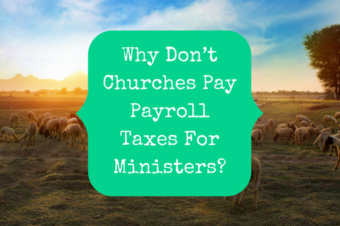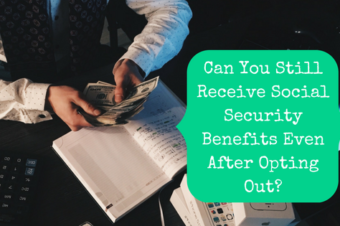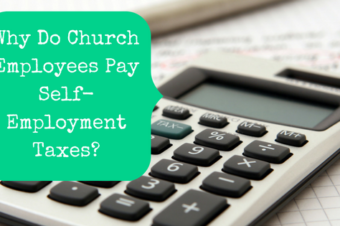
Most pastors don’t go straight from high school or college into the pulpit. Usually, you spend a few years in the secular workforce before settling into your pastoral vocation.
I think that’s a good thing. It gives you some practical work experience, exposes you to how people outside of the church live and work, and, depending on where you work, it can make you really, really appreciate working with Christians once you’re on church staff. At least that was my experience.
Another thing that working a secular job before joining the ministry does is that it forces you to begin paying into the Social Security system. Remember, pastors are unique in their ability to opt out. Everyone else just has to do it and has no say in the matter.
But, what happens to the money that you put into the system if you choose to opt out once you become a licensed minister? Is it all gone or do you still get that money even though you’ve opted out?
How Social Security Eligibility Works
As with most things in the financial world, the answer to that question is it depends. Just like Jesus is always the right answer in Sunday school, it depends is always the right answer if you’re a financial advisor. It does depend, though, and it depends on how long you had paid into the system before opting out.
To be eligible for Social Security retirement benefits, you need to have earned a minimum of 40 “credits.” You can earn up to 4 credits a year. For 2019, you earn one for every $1,360 of wages you have subject to Social Security taxes. That number is adjusted for inflation, so it goes up a little bit each year.
That means that as long as you earn $5,440 this year, you will earn all 4 credits available to you. That’s pretty low, so most people that have even a part-time job earn their full 4 credits each year. Since it’s easy to max out your credits each year, most people who have worked and paid into the system for at least 10 years have acquired their required 40 credits.
The Real Answer
So, the answer to the original question is if you paid into the system for at least 10 years or otherwise earned 40 credits, then you will get money out of Social Security. You won’t necessarily get the money you put in, though, because the system doesn’t work that way.
With Social Security, you aren’t putting money into a retirement account with your name on it the way you do with an IRA or 403(b). You are giving the government money, which they pay out in benefits to people who are collecting payments today, in exchange for a promised future benefit.
Your promised future benefit is determined by your average income over your 35 highest earning years. Because they use 35 years’ worth of income for the calculation, if you only pay into the system for 10 years, then you’ll have 25 zeroes added in when calculating your average. That means your Social Security benefits will be significantly lower than those of someone who worked a high-paying job for over 35 years. But they will also have put in a lot more money than you since it is a flat percentage of income.
How To Know What You Are Eligible For
As you can see, if you’ve worked long enough in a secular job, you are eligible to receive Social Security benefits even if you’ve opted out. Did you know that you are probably eligible to receive other kinds of benefits as well?
Social Security pays more than just retirement benefits. They also pay disability and survivor benefits and cover some of the costs of Medicare. Depending on your age, you may be eligible for some of those benefits even if you don’t have a full 40 credits.
How do you know what kind of benefits you are eligible for and how many credits you have? Sign up with an account at ssa.gov. Once you set up your account with the Social Security Administration, you can review your earnings history and see your estimated benefits. It’s wise to do this now, even if you’re a long way from retirement, to ensure that they have the correct information in their system.
Also, if you were hoping for Social Security retirement benefits and find that you’re just a few credits shy, it might be worthwhile to pick up a side job for a little while just to earn those credits. Even if you’ve opted out as a pastor, any secular work you do will still require you to pay into the system and accrue credits. Opting out only applies to ministerial work.
Even If You’re Eligible, They Might Not Come Easily
Now, just because you’re eligible to receive Social Security benefits doesn’t mean it will be easy for you to file and receive them. Unfortunately, a pastor’s ability to opt out of the system is so unique that most Social Security Administration employees have no idea how it works.
Many pastors have been incorrectly denied benefits or been given bad information by Social Security employees who don’t understand how the law relates to pastors. If you find yourself in that situation, read this article here. It will tell you what to do to receive the benefits that are rightfully yours.
Want to learn more about Social Security for pastors? Check out the following articles:
Opting Out Of Social Security: A Step-By-Step Guide
The True Cost Of Opting Out Of Social Security
What Pastors Need To Know About Social Security Even If They’ve Opted Out
Can You Still Receive Social Security Benefits Even After Opting Out?
Can Pastors Opt Back Into Social Security?
How Medicare Works For Pastors Who Have Opted Out Of Social Security




2 Responses
Jeremy
January 10, 2020My wife and I worked in secular jobs for over twenty years before becoming clergy. We are currently serving the Lord in Italy. If we opted out of S.S. should we still look into disability insurance?
Amy
January 15, 2020Jeremy, You should set up an account at ssa.gov to see what benefits you are eligible for through Social Security. Depending on your situation, you may still be eligible for benefits through SS. Also, consider what would happen if one or both of you became disabled. Would you have a sufficient source of income to support yourselves? If the answer is no, you should look into insurance.